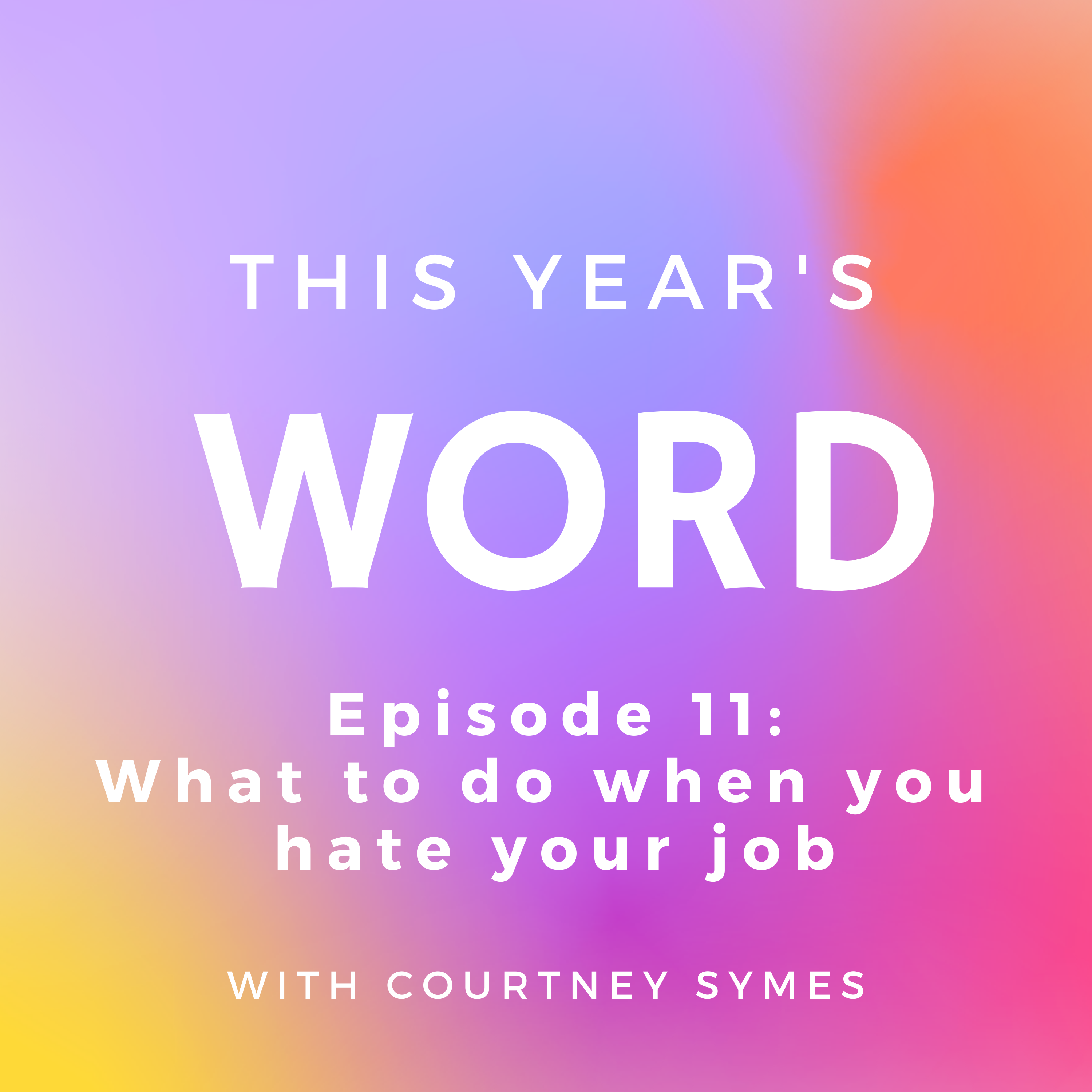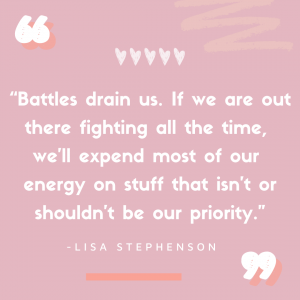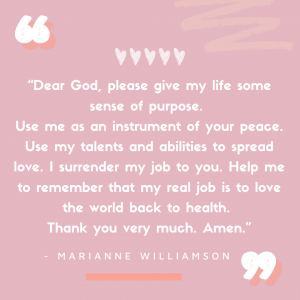This Year’s Word Podcast Shownotes: Episode 11, What to do when you hate your job

Hello and welcome to This Year’s Word Podcast, I’m your host, Courtney Symes. I’m an author, entrepreneur, mum, and wife. In this podcast series, I will share my Word of the Year experience as I explore the meaning of the word “Love” and how you can use this word to change your life, one day at a time.
Today’s episode is the second in our mini-series, Love What You Do, where I’ll be covering ‘life after school’, including going to university, starting a first job, and navigating the workplace.
In this episode I am going to talk about a tabu subject, but something I’m sure we’ve all been through – what to do when you hate your job.
I’ll start this episode by picking up where I left off at the end of episode 10, how to figure out what to do with your life. If you haven’t listened to this one yet, check it out as it will provide a little context to what I am talking about today.
Here’s a quick recap – I had finished university and had just been offered a job with British Department store, Debenhams in their buying office. I commenced my role with gusto, and lapped up the training and experiences I gained.
I worked at Debenhams for three and a half years. During this time, I was promoted and grateful for the opportunity to work across three different areas: lingerie, accessories, and swimwear. I had three very different bosses and learned so much about the industry and working with other people.
For the most part I was content in this fast-paced and stimulating environment. I adored the people I worked with, but couldn’t help but feel something was missing. I had worked my backside off during my degree and often found myself questioning, “Is this it? Is this all there is?”
The flip-side was that the role was sometimes demanding and often stressful. A large part of my time was spent managing the production schedule. Invariably there would be delays caused by sourcing or factory issues, and tough conversations were needed with suppliers. On top of that, we had a strict profit margin requirement we had to adhere to, so there was intense, robust negotiation on prices with suppliers. The constant ‘back and forth’, trying to shave a penny or two off a cost price, was exhausting.
Some mornings as I walked from the tube station to my office I would pass the guy sweeping the street and feel envious of him. He was just sweeping away, with seemingly not a care in the world (although I’m sure this wasn’t the case). I would frequently get home from work and burst into tears, and knew deep down that work shouldn’t impact me this way so often.
The people I worked with were lovely, and I had learnt so much, but my day-to-day role essentially involved relentless negotiation on cost prices and delayed production. It was gruelling, and I couldn’t see how I was adding any value to the world by sending grumpy emails to overworked and underpaid production teams in China and India.
Following an eight-year stint in the UK, my husband and I decided it was time to return home. We had been married for four years and were keen to buy a place of our own and settle back home in Australia before thinking about a family.
Debenhams and a well-known department store here in Australia were owned by the same parent company. My British boss was happy to make a phone call and put in a good word to help me secure a position when I returned home. A couple of weeks after returning home in November, I had an interview at their head office in Melbourne and was offered a position to start in January.
My new manager warned me: “This position, while at a similar level to where you were in the UK, is a very different role with different expectations. Buying and product development is very different in Australia compared to the UK. Oh, and we’ve also had 150% staff turnover in the last 18 months … we’re doing a lot of work on our internal culture at the moment.” I began to wonder what was I getting myself into!
The first couple of weeks were intense as I settled into my new role and tried to find somewhere to live – we’d arrived in Melbourne with a suitcase. My husband was still looking for work, but he managed to find us an awesome one-bedroom apartment within walking distance to work and kit it out with furniture and other essentials.
I started in the womenswear department, backfilling a position that had been suddenly vacated before Christmas. It felt like the deck was stacked against me from the beginning. No buying had been done for the brands I was in charge of for months, and any existing orders were running late. I had regular updates with the buying manager to try and get things back on track.
After a couple of months, my manager had recruited a permanent buyer for this area, and I moved over to sleepwear and intimate apparel, the area I was employed to work in. I thought things would start to settle, but I was mistaken. By Easter, my boss and assistant from that area had resigned, and once again, I was running a department I knew little about on my own. The department manager recognised I needed help and recruited a couple of other people, which did improve things.
I enjoyed working in this department – I loved the product and the camaraderie of my immediate team. However, the water was turbulent outside our little department. The attrition of team members continued, and there were a couple of team members that made my life difficult. The work never ended. When my boss and assistant left, we were behind in buying, which meant many late nights spent at the office trying to catch up.
I was exhausted, and all the extra time spent at work was taking a toll on my relationship with my husband. I managed to talk my department manager into letting me have a laptop and a token so I could work from home. Suddenly I found myself answering emails at 11 pm. No matter how hard I worked, I couldn’t shake the 200+ emails a day or get ahead with planning and production. I felt like I was sinking, no matter how hard I swam.
In her book, Read Me First, Lisa Stephenson acknowledges:
“Battles drain us. If we are out there fighting all the time, we’ll expend most of our energy on stuff that isn’t or shouldn’t be our priority. We’ll be sitting in negativity. We’ll be driven by the need to ‘win’ at all costs. We’ll lose sight of what is actually important and what we really want.”

I felt like I was constantly in ‘fight mode’ – against suppliers and colleagues. Then I found a lump in my breast. I was 26 years-old. After an ultrasound, it was determined it wasn’t anything sinister, but this health scare was enough to make me realise this level of stress was not healthy or sustainable. It was at this point I knew it was time to make a change.
Whilst I felt completely alone at the time, in hindsight, I’m sure most people can relate to this experience on some level throughout their career. Whether it’s feeling overwhelmed by the amount of work that needs to be completed, or dealing with a challenging boss, colleagues, or all of the above.
So, what do we do when we get to this point in our working career? I had worked too hard for too long: three years are university, another three years at Debenhams, and nearly a couple of years in my current role. It was the best part of a decade! But I had never been more miserable in my life, my relationships were suffering, and I’d had a significant health scare.
In my case, I started researching different career options, listening and following the advice of icons like Jim Rohn and Brian Tracy. I even read Richard Nelson Bolles’ What Colour is Your Parachute. I decided the next best move was to develop my transferable skills, particularly in areas I was passionate about. My next career move wasn’t obvious, but I knew if I continued to develop my skills, I would make progress.
When we get to this point in a career I think it is important to stop and take stock. Whilst I knew within six months of starting my new role this was not the right path for me, I stuck at it with the mindset that I would develop my skills and find another role.
Writing, I decided, was the main skill I wanted to focus on developing. I had always enjoyed writing and had received favourable marks in English at school and for written work throughout university. Writing was also a skill I could use in any job, although at the time, I had my sights set on fashion journalism. I found a reputable online course, which would give me the opportunity to pursue part-time work while studying.
In the meantime, I used every opportunity in my current role to develop my skills and championed writing the business plan for our department, as well as writing marketing copy and training documents for stores – I took any and every opportunity I could to develop my writing skills. As soon as I started the course I knew I was on the right track – I absolutely loved the course content and assignments. I was encouraged by my course leader’s positive feedback, and the good marks I received.
My husband was now working full time, so we decided it was feasible for me to work part-time while I completed my writing course. I wanted to continue working in retail, in a part-time capacity, but preferably for a smaller, family-run boutique-type business. I had worked in these types of businesses throughout university and preferred the personability and flexibility of small businesses. The expectations and responsibilities were usually higher in small businesses, but so was the opportunity to learn and grow.
I was offered a position as a part-time retail assistant for a wine boutique in the quaint South Melbourne shopping precinct. The store was within cycling and walking distance from our apartment, and my hours were 10 am-5 pm, which ensured plenty of time in the morning for study and exercise. My quality of life instantly improved. Gone were the long hours in the office or at home responding to emails at 11 pm. And the small team I worked with were absolutely delightful. For the first time in a long time, I felt valued and appreciated at work. For the first year I worked three days a week; Monday, Wednesday and Friday.
Whilst my part-time salary was a big adjustment to my full-time role, it was still sustainable. I reduced my expenses by going out less and not buying lunch every day.
I managed to complete my writing course and decided I needed some experience, so pitched to as many local and national publications as possible. This was 2009, two years after the release of the iPhone, and many people were embracing the technology smartphones offered. The social media boom had begun, and I could see an abundance of opportunity for online content for social media, blogs, videos and more. I secured a regular gig as a columnist for a local Arts magazine, writing a monthly round-up of exhibitions in and around Melbourne. Going to art exhibitions and writing about them – it didn’t get much better than this!
A year or so into my part-time retail role, the manager of the store left and I was offered the manager’s position. Because I had finished my course and was managing to fit my freelance writing work in on weekends and evenings, I happily accepted the position. Whilst my days increased to five per week, and the occasional weekend day, the hours remained the same, and for the most part, I didn’t need to take that work home with me. This was the happiest I had ever been at work.
Here are six things I did (but wish I had figured out sooner) when I was unhappy at work:
1. Determine if your work struggle is a “short” or “long term” problem. I completely stand by the adage, “this too shall pass”. Everything does. The trick is working out how long you’re will to put up with the “this” bit. For example, I worked through some intense periods at work, even in my blissful retail role. Christmas, for example, was our busiest time of year. Customers were often narky and impatient because they were stressed, and the days were long with limited breaks. However, I always knew that Christmas ‘comes but once a year’, and would be gone as quickly as it came.
This is the same with any tricky project, resourcing issues when someone leaves and you have to do their job as well as yours, train new people, or stand in for your boss. The end is in sight and you know this is just a tough season you will get through.
An example of a “long-term” problem is an unprofessional boss, poor work culture or conditions (such as workplace bullying), or an unrealistic workload. There are choices available in these situations, but all of them will involve a tough conversation with your boss, the bully, or even HR. This is definitely worth doing, as it’s important to let people know how you feel before leave a position – you might even be pleasantly surprised by their reaction. If not, at least you’ve explored all options, confirmed your decision to leave, and developed your communication skills in the process!
2. Continue to work on your personal development and transferrable skills. You can’t work enough on your skills, even if you are content in your role. Developing transferrable communication skills such as writing and public speaking, as well as general computer literacy will help your CV stand out from the crowd when you’re vying for a promotion or new role.
I also recommend reading personal development literature, as well as information relevant to your industry. Throughout my buying roles I read every fashion magazine I could get my hands on, as well as trade magazines, trend forecasts and articles on fashion theory. Seek out the best personal development leaders and influencers such as Jim Rohn, Napoleon Hill, Dale Carnegie, Stephen Covey, Peter Drucker, Wayne Dyer, Deepak Chopra, Jack Canfield, Brian Tracy, Les Brown, Tony Robbins, Brendon Burchard, Tim Ferriss – the list is endless, and I’m sure I’ve missed some great ones, but you get the idea. Google ‘leaders in personal development’ and you’ll be spoilt for choice.
When I was trying to decide which direction I should go in after my fashion career, I found the work of Jim Rohn, Brian Tracy and Richard Nelson Bolles (author of What Colour is Your Parachute) particularly helpful. Many of these authors have audiobooks available, which is an accessible way to get exposure to their work – I used to listen to them walking to and from work and it definitely improved my mindset at the start and end of each day.
3. Don’t take your dissatisfaction with work out on your nearest and dearest. I speak from personal experience here. When I was struggling in my second retail buying role, my poor hubby copped the brunt of my moods and frustration. Because what I do means so much to me, I have never been one of those people who can compartmentalise work and not think about it as soon as I walk out of the office. This is because I care, and that’s not a bad thing. But why should those that mean more to me than work suffer as a result of my bad day? I can always get another job, but I can’t replace my loved ones.
4. Don’t be afraid to change jobs or careers. I know, I know – easier said than done, but one of the main reasons we stay where we are is because of fear. Fear of the unknown, fear of what other people will think, fear of sacrificing our salary, fear of having to learn something new, fear of being pushed out of our comfort zone. There are so many fears associated with change. Just know that change is where growth happens. Chances are none of these fears will come true, but so what if they do? You’re not going to die. So what if you try something new and it doesn’t work, just keep moving onto the next thing – nothing to see here people! Just imagine how amazing it would feel to find your dream job because you were brave enough to embrace change.
5. Recognise that challenges are character building. Ok now I sound like my mother, but hear me out. If life was always rosy we’d never: 1. Appreciate the awesome moments, or recognise something incredible when it came along because we’d have nothing to compare it to. 2. We’d never learn a thing.
6. Take time to reflect. Spend some time thinking about what’s not working in your current role, as well as what you enjoy. Don’t be like me and jump from one role to another without realising it’s just the same job with different people, at a different company, in a different country. If you recognise what you want (and don’t want) in your next role, then you’ll know what to look for – and what to run from! You’ll also determine the best questions to ask in an interview, such as employee turnover rate, to determine if you’re falling back into the same situations you want to move away from.
To conclude my little career story, I stayed in my wonderful retail role until I went on maternity leave with my first child. A few weeks before my daughter was born, my husband secured a new position for a company in Canberra, and we made the big move from Melbourne to Canberra when my daughter was two weeks old.
As much as I would have liked to return to my retail job, I don’t think it would have been the same now I had moved into the next chapter of my life, and I was happy I left on good terms. Intuitively, I knew my next career move would be working for myself, and apart from the sleep deprivation that comes part and parcel with a new-born, the timing was perfect.
I launched my business, and eight years on, I am proud to say my business continues to go from strength to strength. It has transformed over the years, as growing businesses and people tend to do. Still, I am grateful for what I have accomplished, especially while juggling other commitments such as our young family and household, freelance writing, and other projects.
I share more of my business journey in my book, A Year of Love: Finding peace one day at a time, which you can find at alittlepinkbook.com/books.
Thanks for listening, and I hope you can join me next time.
I will wrap up this episode with a beautiful prayer written by Marianne Williamson in her book, A Return to Love: Reflections on the Principles of A Course in Miracles:
“Dear God, please give my life some sense of purpose. Use me as an instrument of your peace. Use my talents and abilities to spread love. I surrender my job to you. Help me to remember that my real job is to love the world back to health. Thank you very much. Amen.”

